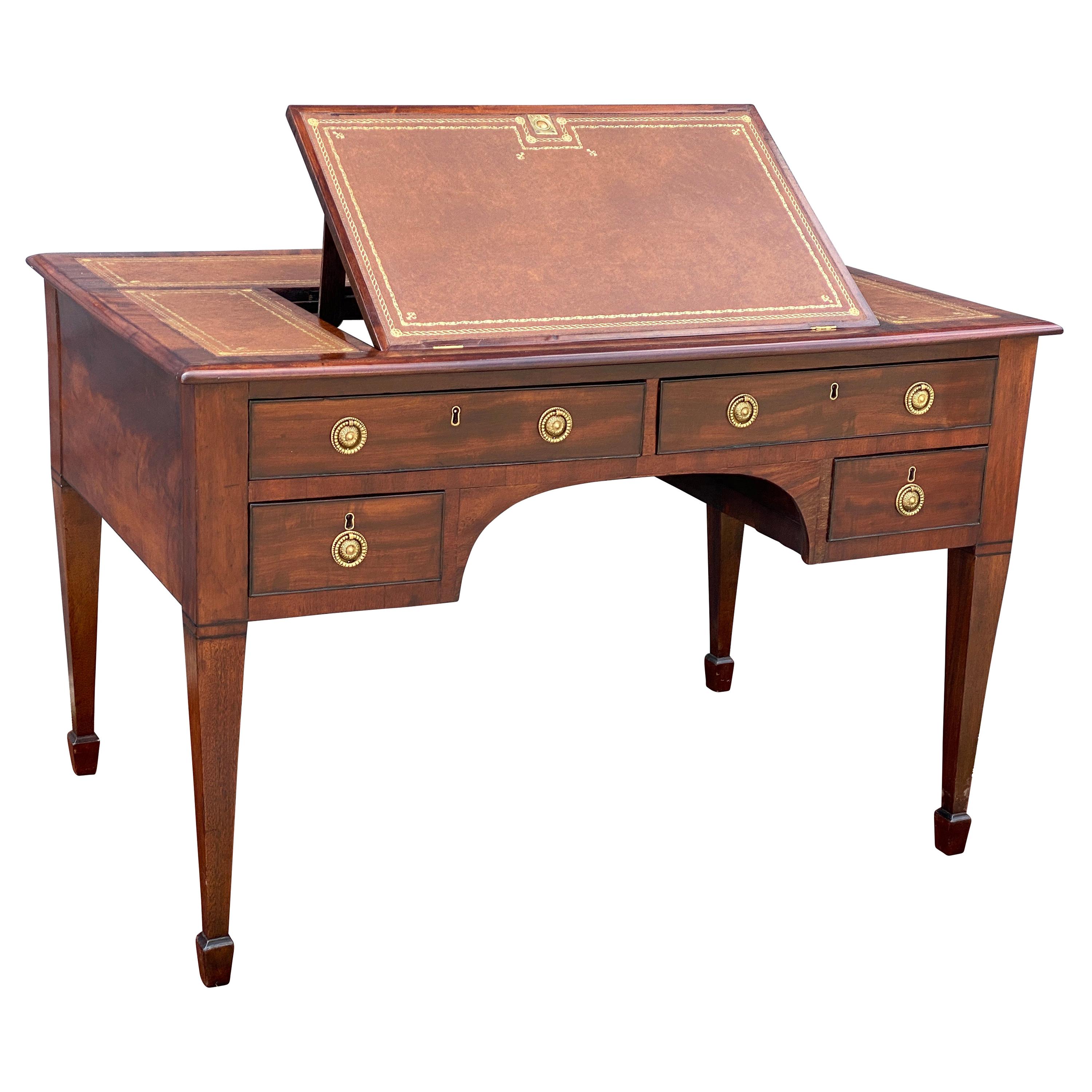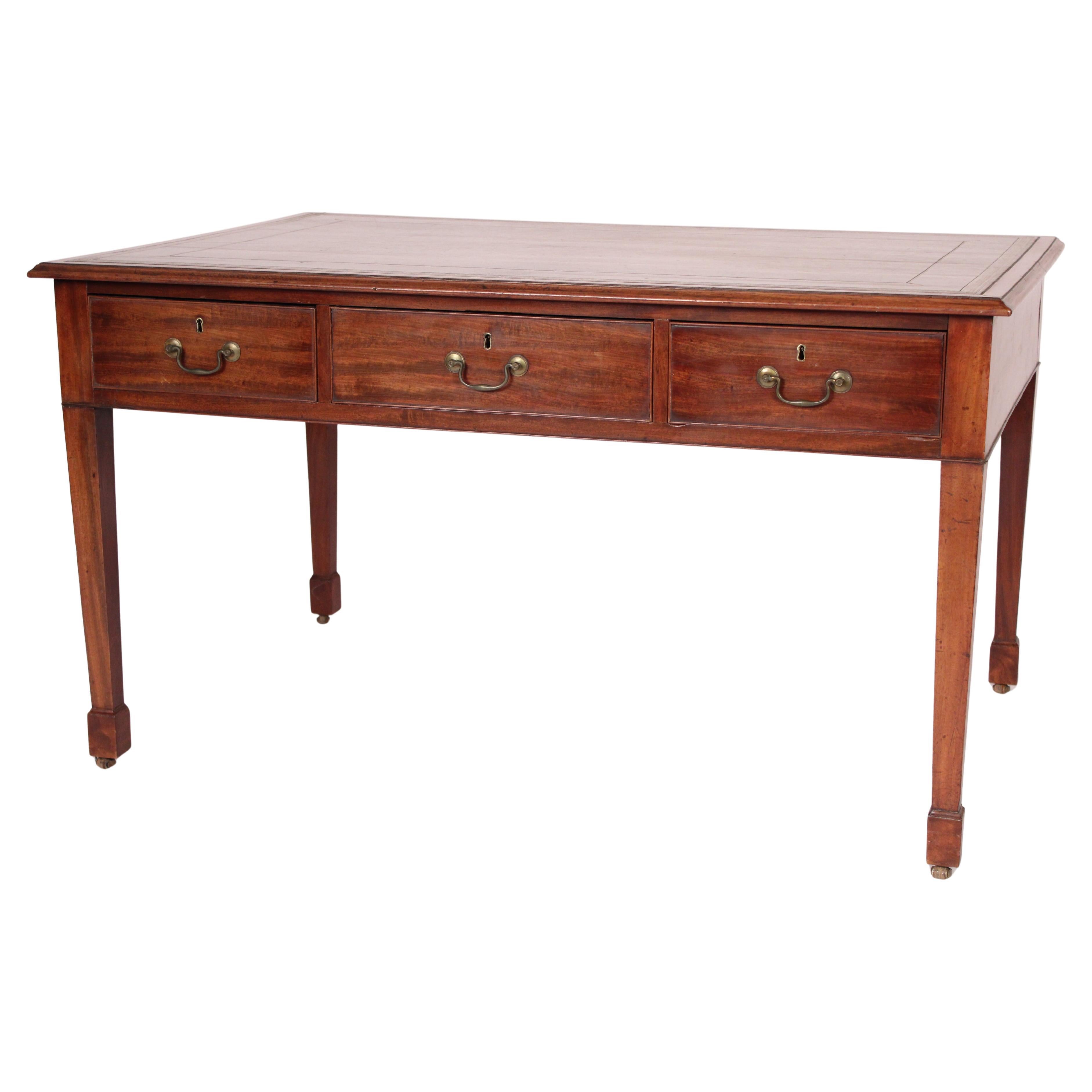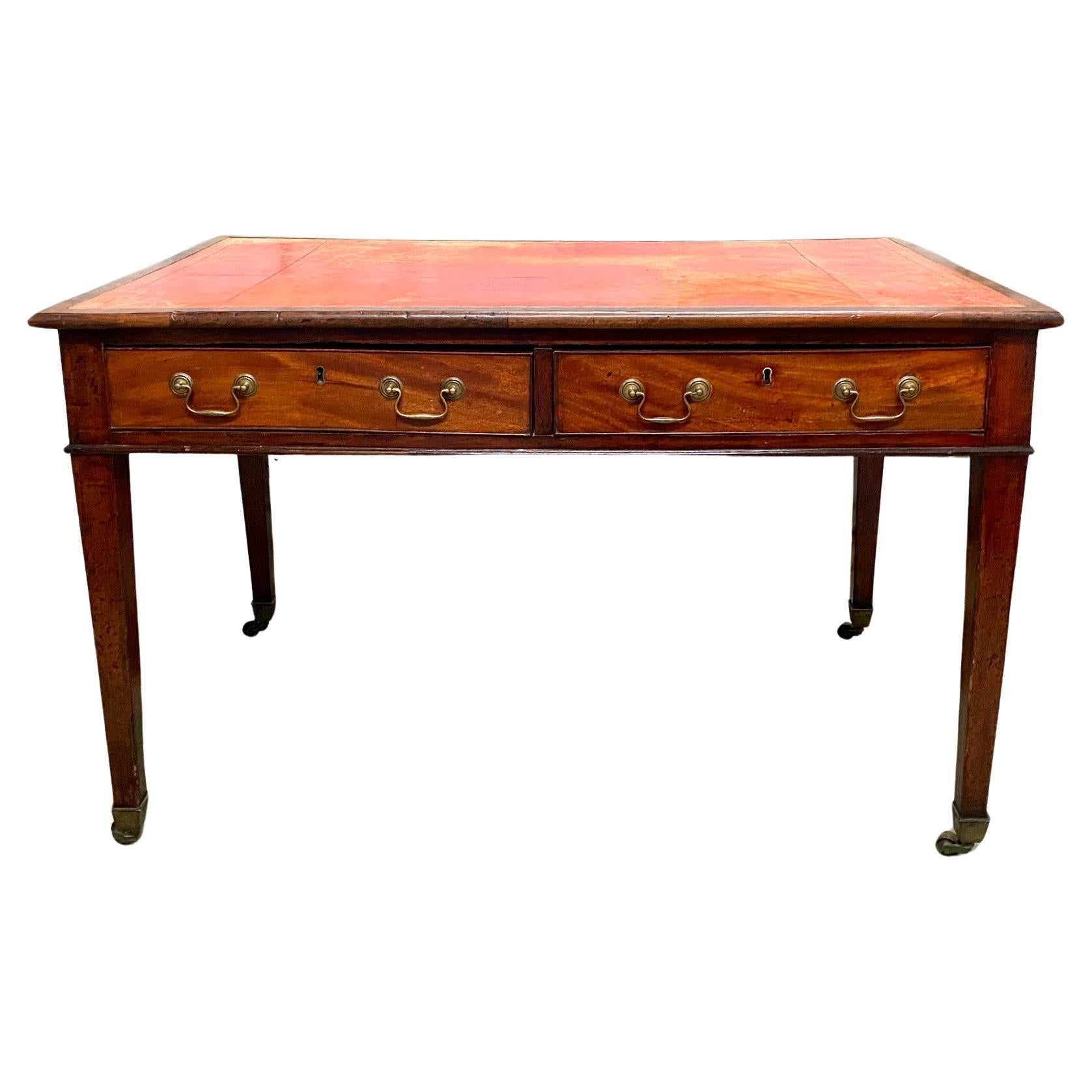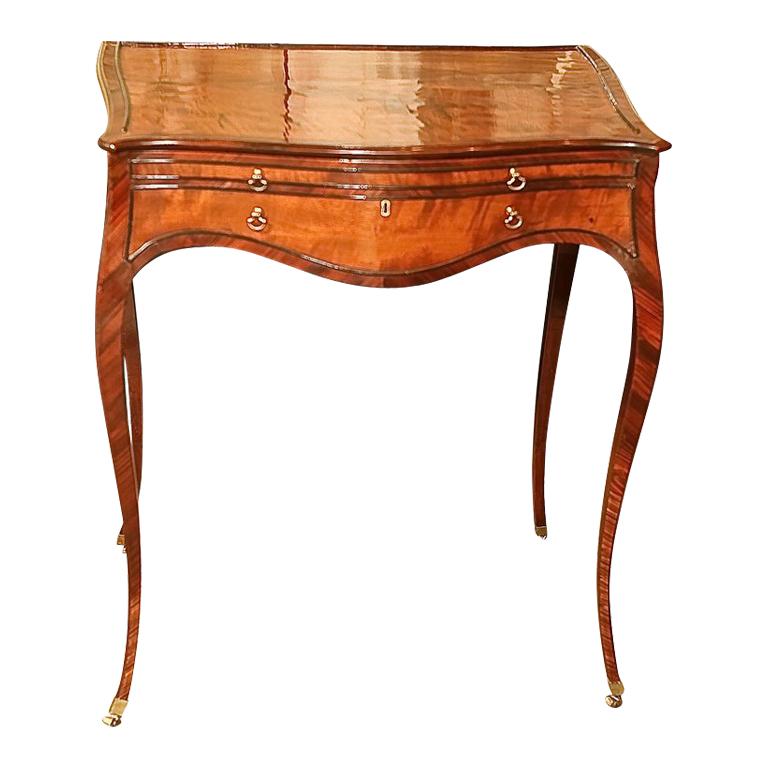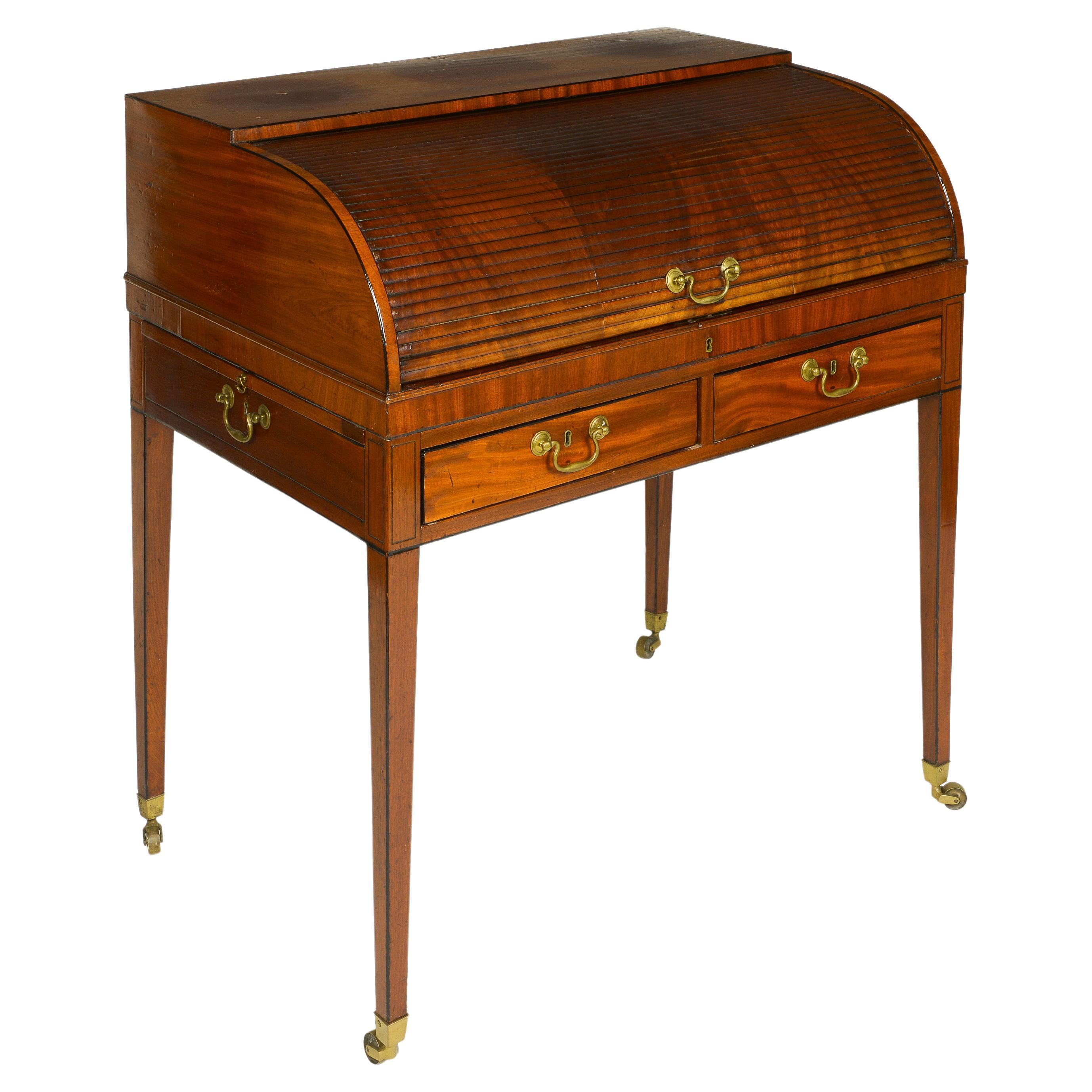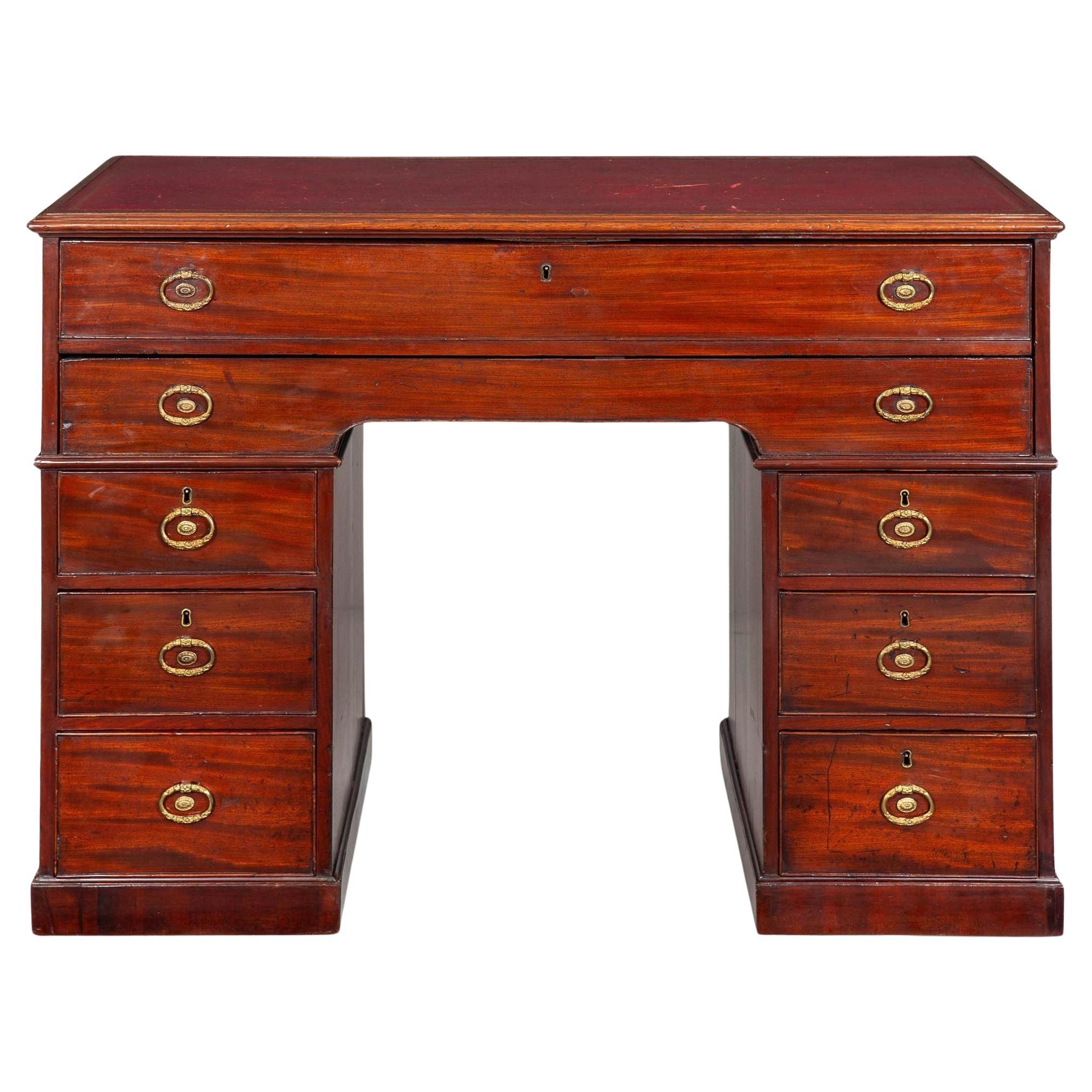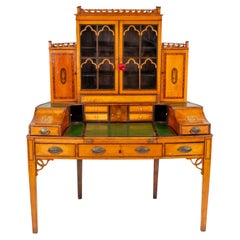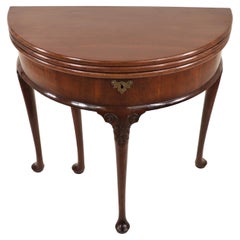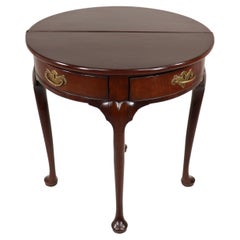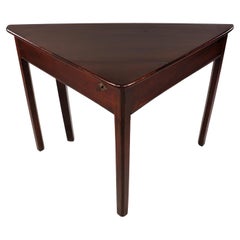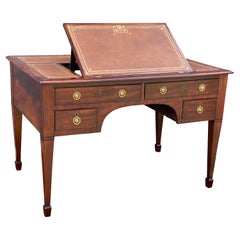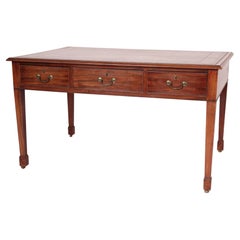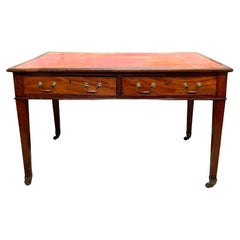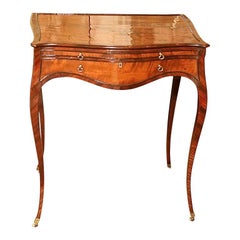Items Similar to Circa 1790 George III Mahogany Writing Table
Want more images or videos?
Request additional images or videos from the seller
1 of 16
Circa 1790 George III Mahogany Writing Table
About the Item
This George III table has gold embossed trim around a beautifully weathered dark green-blue leather tabletop. The square body has been made entirely from mahogany with a mahogany veneer. It has a cross-banded mahogany edge around the leather top. Delicate ebony stringing decorates every edge, outlining the clean simple lines. There are four pull-out drawers, two on opposite sides, with oak lining, offering the perfect amount of space for storing items. Each drawer has a brass swan neck handle. The desk has four straight thin tapered legs with brass-capped feet. While originally a writing table, it could also be used as a partner's desk, worktable, or game table. Overall, it is a beautifully handcrafted piece of furniture that is a perfect example of the later George III furniture that evolved into having a simpler more classic aesthetic with elegant proportions.
H=28.5 in. W=36 in. D=36 in. 55 lbs.
Each drawer: H=3.5 in. W=14.75 in. D=14.5 in.
Kneehole Height=21 in.
- Dimensions:Height: 28.5 in (72.39 cm)Width: 36 in (91.44 cm)Depth: 36 in (91.44 cm)
- Style:George III (Of the Period)
- Materials and Techniques:
- Place of Origin:
- Period:
- Date of Manufacture:1790
- Condition:Repaired: Cracks on the drawer bottoms have been patched with linen strips. Recently waxed. Wear consistent with age and use. Leather original and worn with creasing and slight air bubbles from shrinkage but is fastened. Brass handles are not original. Drawers and respective slots are numbered for a proper fit. H=28.5 in. W=36 in. D=36 in. 55 lbs.
- Seller Location:Chicago, IL
- Reference Number:1stDibs: LU7185238244262
About the Seller
5.0
Gold Seller
Premium sellers maintaining a 4.3+ rating and 24-hour response times
Established in 1964
1stDibs seller since 2022
26 sales on 1stDibs
Typical response time: 1 hour
- ShippingRetrieving quote...Shipping from: Chicago, IL
- Return Policy
Authenticity Guarantee
In the unlikely event there’s an issue with an item’s authenticity, contact us within 1 year for a full refund. DetailsMoney-Back Guarantee
If your item is not as described, is damaged in transit, or does not arrive, contact us within 7 days for a full refund. Details24-Hour Cancellation
You have a 24-hour grace period in which to reconsider your purchase, with no questions asked.Vetted Professional Sellers
Our world-class sellers must adhere to strict standards for service and quality, maintaining the integrity of our listings.Price-Match Guarantee
If you find that a seller listed the same item for a lower price elsewhere, we’ll match it.Trusted Global Delivery
Our best-in-class carrier network provides specialized shipping options worldwide, including custom delivery.More From This Seller
View AllEarly 19th Century George the III Satinwood Desk
Located in Chicago, IL
This Early 19th Century George III satinwood desk exemplifies the elegance and craftsmanship of the period with its neoclassical design. The piece features intricate inlay work, curv...
Category
Antique Early 19th Century British George III Desks and Writing Tables
Materials
Leather, Satinwood
George III English Mahogany Metamorphic Demilune Console Triple Flip Game Table
Located in Chicago, IL
The George III style produced exceptional quality pieces that many collectors have deemed the finest examples of furniture design. During this time Georgian furniture makers preferre...
Category
Antique Late 18th Century English George III Demi-lune Tables
Materials
Mahogany
Fine George III English Mahogany Demilune Table with Two Swing Drawers
Located in Chicago, IL
This is a fine George III English mahogany demilune table with two drawers that swing out. The George III style produced exceptional quality pieces that many collectors have deemed t...
Category
Antique Late 18th Century English George III Demi-lune Tables
Materials
Mahogany
Circa 1760 English George III Folding Handkerchief Tuckaway Corner Table
Located in Chicago, IL
This is an elegant hand-crafted mahogany George III multifunctionality corner table. During this time, corner tables became popular, due to their multi-functional and space-saving characteristics. They easily transform into a square multi-use: tea table, card table, reading table, tea table, etc. Completely utilitarian and space-optimizing, it could be placed in any room and provide many uses. It features an isosceles triangle top with a rear drop leaf. The drop leaf, supported by a gate leg, swings out to expand into a square surface. An oval-shaped brass escutcheon on the plain frieze hints at a compartment. Indeed, opening the lock allowed the top to lift and reveal storage space. It rests on four marlborough legs, another stylistic element of the era. One can use it in a living area and store board games in the storage compartment or use it as a desk or tea table and put it away in a corner when done. Regardless of how it is used or where it is located, it will be a timeless classic of Georgian history...
Category
Antique 1760s English George III Demi-lune Tables
Materials
Mahogany
Early George III Mahogany Serpentine Bachelor's Chest With Brushing Slide
Located in Chicago, IL
The George III design, named after the English monarch, is characterized by clean lines and high-quality wood. This Circa 1760 chest is crafted entirely from mahogany, featuring thre...
Category
Antique Mid-18th Century English George III Commodes and Chests of Drawers
Materials
Mahogany
18th Century English George III Period Mahogany Armchair with Modern Fabric
Located in Chicago, IL
This is a finely carved 1760 English George III armchair. The George III period was named after the English monarch of the time. It was popular among the elite and mercantile class of people, due to its excellent material and intricate carvings. Due to the multiple King Georges, each George developed its own look. The George III period is also referred to as the Chippendale style. This period was often characterized by drawing on both the Rococo and Gothic styles. Pieces sported curves, arches, Chinese influences, and cabriole legs. This chair has been entirely carved out of mahogany; a premiere wood choice known for its durability, longevity, and rich coloring. The back has an elegant splat, a principal element of eighteenth-century English chairs. Splats are the center support for a chair’s open back and originated from the importation of Chinese Ming Dynasty chairs...
Category
Antique 1760s English George III Armchairs
Materials
Mahogany
You May Also Like
George III Mahogany Writing Table
Located in Essex, MA
Rectangular top with all new olive tooled leather and central hinged rest, over a pair of drawers over two small drawers, raised on square tapered legs with spade feet. The back is p...
Category
Antique 1790s English George III Desks and Writing Tables
Materials
Mahogany
George III Mahogany Partners Writing Table
Located in Laguna Beach, CA
George III mahogany partners writing table, circa late 18th century. With an inset tooled leather top, mahogany border and molded front, back and side edges, 3 frieze drawers on each...
Category
Antique Late 18th Century English George III Desks and Writing Tables
Materials
Brass
George III Period Mahogany Writing Table
Located in Montreal, QC
George III Period Mahogany Desk two drawer resting on on square tapered legs castors and the top inset with gold-tooled red leather.
England: circa 1790
Category
Antique 1790s English George III Desks and Writing Tables
Materials
Mahogany
An Important George III Mahogany Writing Table
Located in Hudson, NY
This very fine mahogany writing table made in England in the French taste would have been for only the most current and fashionable people of the time. The table has a serpentine top...
Category
Antique Late 18th Century English George III Desks and Writing Tables
Materials
Ebony, Mahogany
George III Mahogany Roll-Top Writing Table
Located in New York, NY
The rectangular writing table fitted with two frieze drawers and with pull-out candle slides to the sides; raised on square tapering legs ending in brass caps and casters; surmounted...
Category
Antique 1790s English George III Desks and Writing Tables
Materials
Brass
George III Mahogany Architect’s Desk attr. Gillows of Lancaster circa 1790
Located in Shippensburg, PA
GEORGE III MAHOGANY ARCHITECT'S DESK IN MANNER OF GILLOWS OF LANCASTER
England, circa 1790 with alphabetized rent drawers interior unmarked
Item # 405KYH28Z
This remarkable architect's pedestal desk was almost certainly crafted by Gillows of Lancaster, London circa 1790. It features a rectangular top inlaid with maroon gilt-tooled leather bordered by a molded edge. Below this is situated a full-width frieze drawer which is decorated to appear as two false drawers over pedestals containing three graduated drawers on either side of an open kneehole. The desk stands on a molded plinth base fitted with casters.
The top drawer reveals a sliding gilt-tooled leather writing surface with a central panel that can be lifted on ratchet supports to hold and display documents. This surface slides back to uncover a lower compartment with an open storage area, flanked by three lidded compartments labeled alphabetically within oval reserves. The back of the desk is designed for a tidy appearance, making it suitable for placement in the center of a room, featuring two full-width faux drawers above faux cabinet doors in the pedestals.
While the present example is not marked by Gillows, it is almost without question a product of their workshops and is firmly attributed to their design books. The alphabet inlaid drawers were inspired by designs popularized by Thomas Shearer’s The Cabinet Maker’s London Book of Prices (1788-1803). These were employed in designs published by Gillows, such as the 'bureau writing-table' with a double-ratcheted top made for the Earl of Shrewsbury in 1789 and a writing-table from 1794 (see Gillow Furniture Designs 1760-1800, L. Boynton, ed., 1995, pl. 24 and 41). A similar design appears in the firm’s 1798 Estimate Sketch Book (p.1481), preserved in the Westminster City Library. The drawer design is further seen on pedestal desks stamped by Gillows, including the library table provided by the firm in 1778 to Denton Hall (see C. Gilbert, The Life and Works of Thomas Chippendale, London, 1978, vol.II, p.246, pl.449).
Gillows produced many variations of this desk style, including those with ratcheting tops for standing use, enclosed kneehole designs, various types of pulls, and subtle dimensional adjustments. Examples can be seen well into the George IV period and the influence of this form on later desks by Gillows can be seen as the tastes changed into the second half of the nineteenth century.
Sir Walter Scott acquired a similar desk from Gillows for his Edinburgh house in Castle Street in 1810, later moving it to his study at Abbotsford in 1826. In a letter to J.B. Morritt of Rokeby Hall, Yorkshire, dated May 1810, Scott wrote: ‘You know I fell in love with your Library table and now the The Lady [The Lady of the Lake] has put crowns into my purse I would willingly treat myself unto the like...’ On 9 August, Scott wrote again to Morritt: 'I must not omit to tell you that Gillows table has arrived and gives great satisfaction. Everyone that sees it likes it so much I dare say I shall have some commissions to send him. His bill did not much exceed yours being about £30 ready money’. The Gillow archives from 1810 record: ‘pack for W.Scott Esq., Castle Street, Edinburgh, case containing mahogany bureau writing table Double Elevating tops cupboard in center complete writing drawers’. (See C. Wainwright, The Romantic Interior, Fig 162 & 163).
A few open-market examples of nearly identical desks...
Category
Antique 18th Century English George III Desks and Writing Tables
Materials
Leather, Mahogany
